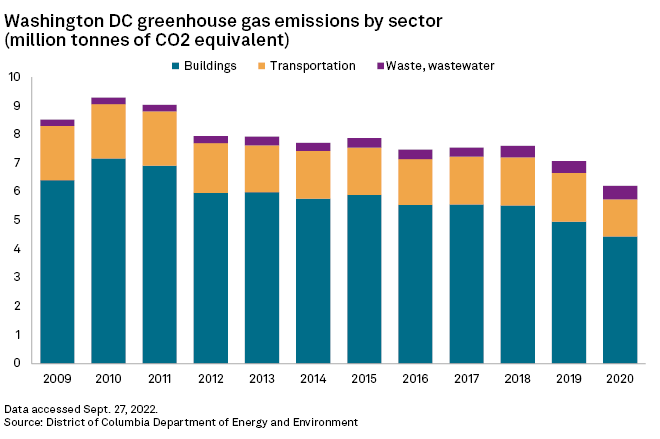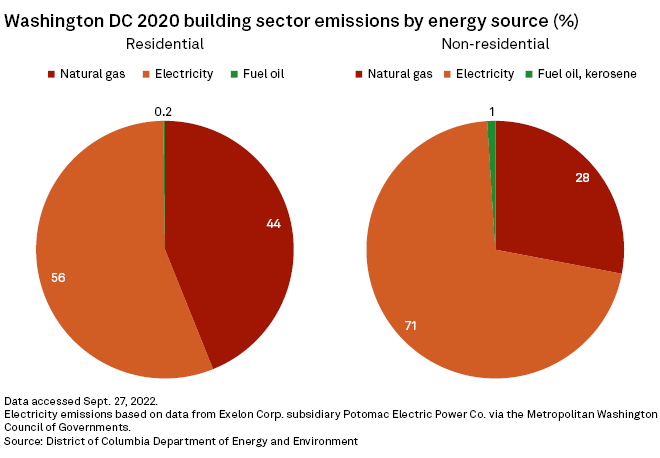S&P Global Offerings
Featured Topics
Featured Products
Events
S&P Global Offerings
Featured Topics
Featured Products
Events
S&P Global Offerings
Featured Topics
Featured Products
Events
Banking & Capital Markets
Economy & Finance
Energy Transition & Sustainability
Technology & Innovation
Podcasts & Newsletters
Banking & Capital Markets
Economy & Finance
Energy Transition & Sustainability
Technology & Innovation
Podcasts & Newsletters
S&P Global Offerings
Featured Topics
Featured Products
Events
28 Sep, 2022

| New residential and commercial building developments in Washington, D.C., will not have access to natural gas if the district adopts a pair of construction code updates. Source: Barry Winiker/Photodisc via Getty Images |
Washington, D.C., could become the latest East Coast city to prohibit natural gas use in new homes and commercial buildings if a divisive all-electric construction mandate survives an upcoming vote.
The district's Construction Codes Coordinating Board, or CCCB, is slated to vote in October on a proposal to prohibit fuel oil and gas hookups in new commercial buildings, including apartment complexes. In May, the CCCB voted to require all-electric construction in residential buildings with three floors or fewer, part of a package of code updates aimed at decarbonizing new homes.
However, the all-electric residential code update passed on a narrow 6-5 vote, and the commercial code proposal has been bogged down in debate for months. Building and restaurant groups and other stakeholders have sought broader carve-outs for certain end uses, while code developers have tried to limit exemptions.

The wording of the final gas ban proposal is critical: Once the CCCB finishes amending the entire code, it will face an up-or-down vote in the Council of the District of Columbia, where there is broad support for restricting fossil fuel use.
The all-electric proposals would advance the city's goal of constructing all new buildings to a net-zero energy standard. That means new buildings would be capable of meeting their annual energy demand through rigorous efficiency and on-site clean energy production.
The strategy is part of the district's broader plan to reduce economywide greenhouse gas emissions 50% by 2032 and reach carbon neutrality by 2050. The building sector generated 72% of the district's annual greenhouse gas emissions in 2020, according to city data.
District is part of evolving gas ban movement
The district's approach provided more evidence that the gas ban movement is migrating to the building code update process. To date, most gas bans have passed as ordinances adopted by city councils. In April, Washington became the first state to include broad electrification mandates in its updated building code, following Seattle's example a year earlier.
Many cities and states update their building codes every few years to incorporate model codes periodically developed by private organizations. In recent years, sustainability groups have seen an opportunity to advance building electrification through this process of reestablishing minimum efficiency standards.
Among those groups is the New Buildings Institute, or NBI, which released model code language for achieving carbon-neutral buildings in February 2021. Requiring advanced electric heating equipment like heat pumps is part of the solution because the equipment is capable of achieving higher energy efficiency than standard gas furnaces. Electric heating also integrates with other solutions like rooftop solar, electric vehicle chargers and smart thermostats.

"The reason that we don't just go after building electrification alone ... is because all of those other pieces support grid decarbonization," NBI's director of codes, Kim Cheslak, said in an interview. "We want those buildings to all become integral pieces of the grid, such that the grid can also seek to be decarbonized."
Members of the district's construction codes team approached NBI about incorporating some of its code language into the district's latest update, according to Cheslak. The collaboration yielded a proposal to prohibit fuel gas and oil piping and ban most combustion equipment in new residential buildings. The commercial code proposal would require all-electric new construction, with exemptions for commercial kitchens and healthcare and detention facilities.
City's approach fuels debate
Those proposals were not controversial within the CCCB's technical advisory groups, where experts mold proposals into enforceable code language, Cheslak said. However, they have fueled lengthy debate among the 14-seat board that approves individual proposals for inclusion in updated construction codes.
During the CCCB's May meeting, board members argued over the cost and emissions benefits of building electrification. Opponents said electric power rates are higher and the district still relies on fossil fuel-fired power generation. Supporters said studies show high-efficiency electric heating yields cost savings and noted that the district is legally mandated to procure 100% of its electric power from renewable sources by 2032.

"There have been honest conversations that the increased cost of [all-electric building mandates] could decrease the amount of affordable housing we're able to build — and that raises major concerns in a city like D.C. or New York," Eric Jones, vice president of government affairs at the Apartment and Office Building Association of Metropolitan Washington, said in an interview. "Funny enough, a lot of the cities making these moves are also the cities that have the greatest need for affordable, moderated workforce housing."
The District of Columbia Building Industry Association and AltaGas Ltd. subsidiary Washington Gas Light Co., the city's gas distributor, did not return a request for comment. The Associated Builders and Contractors of Metro Washington declined to comment. The Restaurant Association of Metropolitan Washington did not respond to emailed questions.
Deadline for implementing net-zero energy
Despite concerns from those stakeholders, the CCCB is now on a deadline to significantly tighten the construction code before a failsafe snaps into place.
The District of Columbia Council passed an ordinance in July ordering the CCCB to develop construction codes that require new commercial buildings to meet a net-zero energy standard. If those regulations are not in place by Jan. 1, 2027, all construction will have to follow a voluntary net-zero energy code, adopted as Appendix Z to the 2017 District of Columbia Construction Codes.
The 2027 deadline means the CCCB has another three- to four-year update cycle to develop a code that achieves the standard. The all-electric construction mandate and other climate-oriented updates proposed in the current cycle will not be enough to establish that standard, according to Cheslak. In Cheslak's view, the incremental approach was warranted because the gap between the 2017 code and Appendix Z was too wide to bridge in a single cycle.
Additionally, few if any buildings have opted to follow Appendix Z, which remains confusing and difficult to comply with, Cheslak said. The district has not yet built a supportive framework around Appendix Z, including incentives and dedicated programming, Cheslak said. Cheslak pointed to Massachusetts as a state where robust support for a voluntary stretch energy code has led to widespread adoption. NBI is helping the district revise Appendix Z.
Appendix Z was "sort of like a shot across the bow to let people know what was coming," Cheslak said. "But without that supportive infrastructure, they just did not get the adoption that they were hoping for."
S&P Global Commodity Insights produces content for distribution on S&P Capital IQ Pro.
